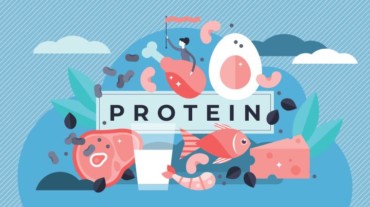
Healthy and ideal nutrition has been a cornerstone of Ayurveda science for centuries. In fact, Ayurveda views health from a higher perspective – that of the integration of nature with the human body. It’s more of a ‘lifestyle’ rather than a stout medicine theory. Ayurvedic ‘panchabhoota’ is one of its core philosophies, according to which the entire living as well as non-living matter is made up of the five basic elements. These are the earth, water, fire, air, and the sky. Collectively, these elements are called the pancha bhootas, and nourish us as well.
Ayurvedic preaching postulates that the human body can fulfil all its nutritional needs from naturally available foods and herbs, in an ethical way.
Protein is one such macronutrient which we all require to live a healthy life. While Ayurveda acknowledges the importance of protein; more specifically, it guides us not to view any single nutrient as the ‘be all’. Ayurveda educates us on keeping our nutrition optimal.
Also, read: Unable to build lean muscle? Up your protein absorption with these tips
We are what we eat is an old saying. Indeed, while fulfilling our nutrient requirements is important, the nutrient sources also have a bearing not just on our bodies, but minds and actions too. One may even say that the seven deadly sins – lust, gluttony, greed, laziness, anger, envy, and pride – have at least some genesis in the food we eat.

So, while protein is good for us, we should try eliminating the ‘baggage’ with which it might come, such as the adverse effects of animal meat on overall health; not to mention the insensitivity towards animal suffering.
Also, read: Has your protein powder expired? Here’s why you need to throw it out right now
This article explores two sources of non-meat protein – plant-based, and whey – which will help you understand which protein is better suited to your health and lifestyle. It will also help clear a few misconceptions people may have about the type and quantity of proteins we actually need. For instance, you would be able to appreciate that it’s possible to get adequate protein from sources other than animal meat alone, and ones which would not only build muscles, but improve your overall health.
These are foods derived from all naturally occurring plant-based sources. Few of the best sources of plant protein are:lentils (all pulses, or ‘daal’ in Hindi), brown rice, soy beans, chickpeas (‘chana’ in Hindi), beans (like ‘rajma’, ‘lobia’ in Hindi), broccoli, oats, almonds, and quinoa (‘bathua’ in Hindi).
‘Whey’ is derived from the watery portion of cow’s milk. Milk contains two proteins, casein and whey. Whey is one of the by-products when cheese is produced from milk – when the fatty parts of the milk coagulate, whey is separated. So, whey is a type of milk protein.
Select Topics of your interest and let us customize your feed.
PERSONALISE NOWAlso, read: 5 common myths about eating protein that you NEED to stop believing
Whey is rich in all the nine essential branched-chain amino acids, functional peptides, immunoglobulins and antioxidants. Therefore, it is considered an exceptionally high quality ‘complete’ protein, popular with people into weight-training and athletics.
Plant-based proteins contain far less calories than animal based protein sources. Therefore, it suits people who are looking to shed weight, while still building muscle mass.

Secondly, plant protein sources are rich in fibre and other vitamins and minerals. Fibre aids digestion and keeps your stomach clean and healthy. Moreover, several plant protein foods are known to help maintain healthy blood pressure and keep cholesterol levels low. Some also assist in warding off several types of cancers, due to their antioxidant properties.
The pros with whey protein are similar to those of plant protein.
The biggest disadvantage with plant protein sources is that they all lack one or more of the essential branched chain amino acids, which are the building blocks of protein. Also, the protein level is generally not as high as in animal protein sources.
Therefore, one must include a variety of plant protein foods in substantial amounts to get all of the nine essential amino acids. This can be tough for the average Indian, and with the fast-paced lifestyle. That’s where whey protein scores over plant protein; as it contains all nine essential amino acids.
However, whey might not suit those who are allergic to milk / milk products in general. Such people cannot digest whey properly. This leads to problems like bloating, stomach cramps and loose motions. In excess quantities, whey protein can also lead to skin problems like acne.

At the same time, whey is not a naturally found nutrient; so its availability in whole form is largely limited to supplements such as whey protein powders.
Firstly, assess your daily protein requirement. If you mostly lead a sedentary lifestyle, then 0.8 grams of protein per kilogram of body weight is ideal daily. However, weight-trainers and athletes require higher protein intake. It could be as much as 2 grams of protein per kilogram of bodyweight, daily.
At the same time, regular excess consumption of any type of protein (for those who believe more is better) can lead to dangerous complications, such as kidney failure.
Once you’ve decided your ideal protein intake, compare the pros and cons of both plant and whey protein to determine which suits you best.
Nonetheless, plant food forms the basic part of nutrition, and even if you’re using whey supplements, a well-balanced nutrition would serve you best in the long run.
Get Latest Updates on Healthy Eating, Nutrition, Recipes, Superfoods